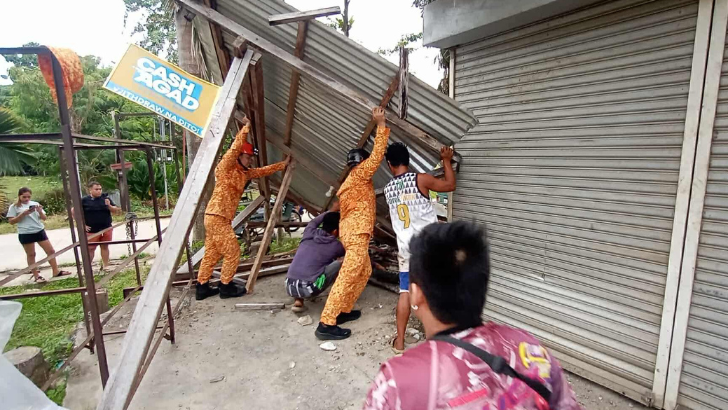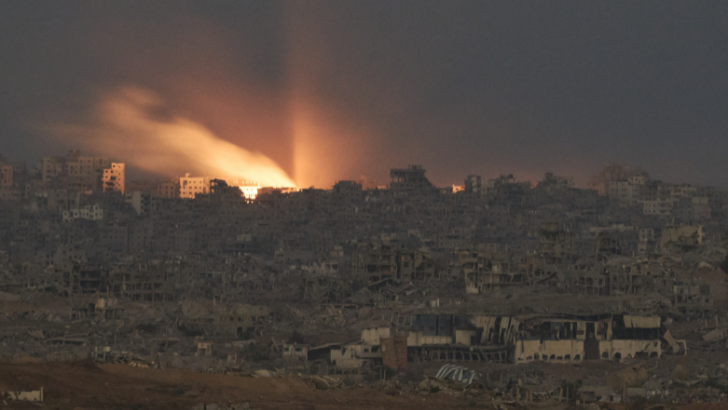Second powerful earthquake strikes off Philippines, after 1st one kills 5
It wasn't immediately clear if it was a separate earthquake or an aftershock of the 7.4 magnitude quake.
PTI
-
Two patients undergoing treatment at a hospital died of heart attacks due to the earthquake. (PTI)
Manila, 10 Oct
Two powerful offshore earthquakes struck the same region in
the southern Philippines hours apart on Friday.
The first one, a 7.4 magnitude quake in the morning, killed
at least five people, set off landslides, damaged hospitals and schools and
prompted evacuations of coastal areas nearby because of a tsunami warning,
which was later lifted.
The second one had a preliminary 6.9 magnitude. Philippine
Institute of Seismology and Volcanology chief Teresito Bacolcol said that
Friday night's earthquake that jolted Manay town in Davao Oriental province was
caused by movement in the same fault line, the Philippine Trench, at a depth of
10 kilometres (6 miles).
It wasn't immediately clear if it was a separate earthquake
or an aftershock of the 7.4 magnitude quake.
President Ferdinand Marcos Jr., facing his latest natural
disaster after a recent deadly quake and back-to-back storms, said the
potential damage was being assessed, and rescue teams and relief operations
were being prepared and would be deployed when it was safe to do so.
The first quake was centred at sea about 43 kilometres (27
miles) east of Manay town in Davao Oriental province and was caused by movement
in the Philippine Trench at a depth of 23 kilometres (14 miles).
At least five people were killed, including two patients who
died of heart attacks at a hospital during the first earthquake and a resident
who was hit by debris in Mati city in Davao Oriental, Ednar Dayanghirang,
regional director of the government's Office of Civil Defence, told The Associated
Press by telephone.
Two villagers died and several others were rescued with
injuries by army troops and civilian volunteers in a landslide set off by the
first quake in a remote gold-mining village in Pantukan town in Davao de Oro
province near Davao Oriental, Dayanghirang said.
Office of Civil Defence deputy administrator Bernardo
Rafaelito Alejandro IV said that several buildings sustained cracks in their
walls, including an international airport in Davao City, but it remained
operational without any flights being cancelled, Alejandro said.
“I was driving my car when it suddenly swayed, and I saw
power lines swaying wildly. People darted out of houses and buildings as the
ground shook and electricity came off,” Jun Saavedra, a disaster mitigation
officer of Governor Generoso town in Davao Oriental, told The Associated Press
by cellphone.
“We've had earthquakes in the past, but this was the
strongest,” Saavedra said, adding that the intense ground swaying caused cracks
in several buildings, including a high school, where about 50 students were
brought to a hospital by ambulance after sustaining bruises, fainting or
becoming dizzy because of the first quake.
Governor Generoso is a town about 100 kilometres (62 miles)
south of Manay, where school classes in all levels were also suspended.
Children evacuated schools in Davao City, which has about
5.4 million people and is the biggest city near the epicentre, about 250
kilometres (155 miles) west of Davao Oriental province.
The Pacific Tsunami Warning Centre in Honolulu said that
small waves were detected on the coasts of the Philippines and Indonesia before
the threat passed about two hours after the first quake. It said that small sea
fluctuations may continue.
A tsunami warning that set off evacuations in six coastal
provinces near Davao Oriental was later lifted without any major waves being
detected, chief government seismologist Teresito Bacolcol said.
Indonesia's Meteorology, Climatology and Geophysics Agency
said that small tsunami waves were detected in North Sulawesi province with
heights ranging from 3.5 to 17 centimetres (1.3 to 6.7 inches) in Melonguane,
Beo, Essang and Ganalo in the Talaud Islands districts.
The Philippines is still recovering from a September earthquake
with a 6.9 magnitude that left at least 74 people dead and displaced thousands
of people in the central province of Cebu, particularly in Bogo city and
outlying towns.
The archipelago is also lashed by about 20 typhoons and
storms each year, making disaster response a major task of the government and
volunteer groups.
Also, on Friday, an earthquake with a preliminary magnitude
of 6.0 struck off the coast of Papua New Guinea. The US Geological Survey said
that it was centred in the Bismarck Sea 414 kilometres (257 miles) northeast of
Lae, the South Pacific island nation's second-most populous city.
Lae police official Mary Jane Huafilong said that no damage
was reported.
Leave a Reply
Your email address will not be published. Required fields are marked *













.png)

.png)


.png)
.png)
